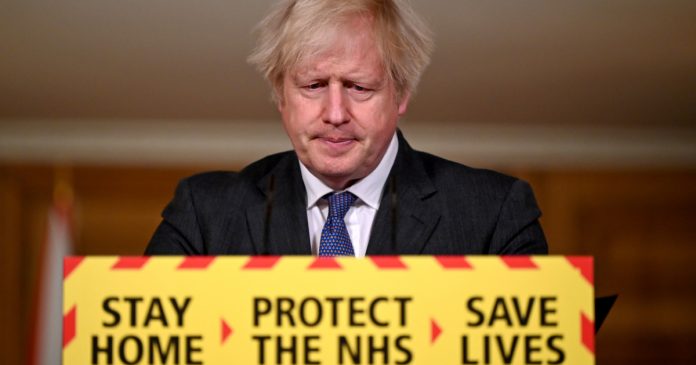[ad_1]
British Prime Minister Boris Johnson has said the new variant of COVID-19 first identified in England may be associated with a higher level of mortality although he said evidence showed both vaccines being used in the country are effective against it.
Johnson said the effect of the new variant, which is already known to be more transmissible, was putting the health service under “intense pressure”.
“We’ve been informed today that in addition to spreading more quickly, it also now appears that there is some evidence that the new variant – the variant that was first discovered in London and the southeast (of England) – may be associated with a higher degree of mortality,” he told a news briefing.
Johnson said however all current evidence showed both vaccines remained effective against old and new variants.
Chief Scientific Adviser Patrick Vallance said the evidence about mortality levels was “not yet strong”, and came from a “series of different bits of information”, stressing there was great uncertainty around the data.
He said once people reached hospital, there was no greater risk, but there were signs that people who had the UK variant were at more risk overall.
“There’s no real evidence of an increase in mortality for those in hospital. However, when data are looked at in terms of those who’ve been tested positive … there is evidence that there’s an increased risk for those who have the new variant, compared to the old virus,” he said.
He said for a man in his sixties, the average risk was that 10 in 1,000 people who got infected would be expected to die, but that this rose to roughly 13 or 14 people in 1,000 with the new variant – a 30-40 percent increase.
“I want to stress that there’s a lot of uncertainty around these numbers and we need more work to get a precise handle on it,” he said.
“But it obviously is a concern that this has an increase in mortality as well as an increase in transmissibility.”
But Al Jazeera’s Neave Barker, reporting from London, said scientists seemed more concerned about the growing evidence that suggested new variants recorded in South Africa and Brazil had features that could reduce the potency of the vaccines that have been developed so far.
“They know that the UK variant can be treated but these other two there may be some problems,” he said.
“So concerns that are being raised about people arriving into the country from these infected areas, and what would happen given the numbers are already very high if these particular strains started to take off within the population too.”
Fresh blow
The warning about the higher risk of death from the new variant identified in the UK late last year, came as a fresh blow after the country had earlier been buoyed by news the number of new COVID-19 infections was estimated to be shrinking by as much as 4 percent a day.
Data published earlier on Friday showed 5.38 million people had been given their first dose of a vaccine, with 409,855 receiving it in the past 24 hours, a record high so far.
England and Scotland announced new restrictions on January 4 to stem a surge in the disease fuelled by the highly transmissible new variant of the coronavirus, which has led to record numbers of daily deaths and infections this month.
The closely watched reproduction “R” number was estimated to be between 0.8 and one, down from a range of 1.2 to 1.3 last week, meaning on average, every 10 people infected will infect between eight and 10 other people.
But the Office for National Statistics estimated that the prevalence overall remained high, with about one in 55 people having the virus.
“Cases remain dangerously high and we must remain vigilant to keep this virus under control,” the health ministry said. “It is essential that everyone continues to stay at home, whether they have had the vaccine or not.”
The UK has recorded more than 3.5 million infections and nearly 96,000 deaths – the world’s fifth-highest toll – while the economy has been hammered. Figures on Friday showed public debt at its highest level as a proportion of gross domestic product (GDP) since 1962, and retailers had their worst year on record.
[ad_2]
Source link











